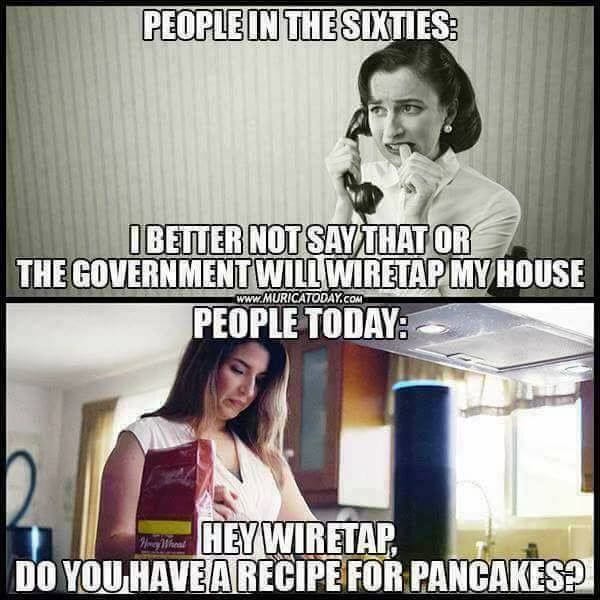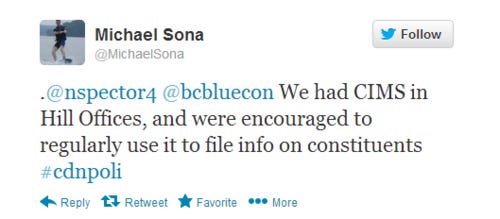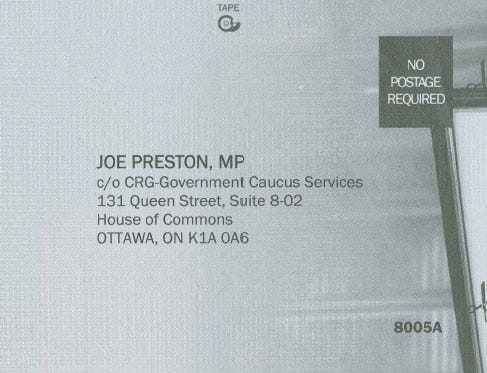How Conservatives Spent Millions in Public Money Building their Party's Voter Database. Odds Are, You're In It.
Under the Harper Conservatives, the government launched a campaign to use public money and MPs offices to collect information on Canadians' voting intentions.
The most important parts of any campaign is the databases of voters kept by campaigns, and how campaigns use that data to influence people.
In Canada, political parties and candidates receive an official voters’ list from authorities (Elections Canada in federal elections), which are pretty bare bones. They include the eligible voters living at an address, and that’s about it.
Campaigns then add to that information based on canvassing - door knocking, phone calling, indicating people’s voter preference, and whether they would take a sign.
Over the years, information technology and social media have changed the kind of information that has been collected - adding all types of demographic information and in particular issue-based information for the purpose of wedge issues.
Political parties build up profiles of voters.
One of the “innovations” in social media is the collection and sale of people’s personal information that people provide to internet companies - or that is stolen or “scraped” from public sites.
This is “Big Data” - Google, Facebook and every marketing company you can imagine collects your personal information and selling it to advertisers and companies, who can cross-reference it and build a specific profile about your income, political views, purchases, gender, marital status, children, religion - everything about you.
Both Canada and the EU have stricter privacy laws than the U.S., that are supposed to allow people to have control over their own information: every organization is supposed to have a privacy officer.
In Canada, if someone is keeping information on you, you as an individual are allowed to ask them what information they have on you, and ask them to get rid of it, but it applies only in limited ways to political parties.
When the Conservative Party in Canada was in government, they collecting personal information on Canadians using government resources and public funds, and handing the data over to their party.
Canadians were not been told what their information would be used for, and their information is being taken without them knowing about it at all, through spying people on social media and recording their opinions.
Now, people may react to the news that the Conservatives are gathering this information and say, “this is what all political parties do.” Political parties may gather information and build lists without being straightforward about it. But only the Conservatives have done it on such a massive scale, and only the Conservatives have had their database used to discourage opponents from voting.
The Conservative database is called CIMS - Constituent Information Management System. It was said to have ten to 18 “data points" for every Canadian - 320 to 576 million pieces of information.
How was this information collected?
Every time a constituent called into an MP’s office, the issue they raised was added to CIMS. These are tweets from Michael Sona to Susan Delacourt. Sona is one of the only people who has been charged in the Guelph robocalls case.
The Conservatives spent tens of millions building up a database that records where you live, how you vote, what you earn, and very likely whether or not you own a gun.
Stephen Taylor is a Conservative organizer and data expert who helped organize cross country Rallies for Canada when Harper was nearly defeated on a confidence vote in 2008, and who worked briefly at the National Citizens’ Coalition. In 2013 he told an audience at the then- “Manning Centre for Building Democracy”
“[The party] sent out, I think, probably a hundred million pieces of mail. Paid for by the taxpayer, I should say. They were each barcoded, and they were each very issue-specific. Most people would sort of ignore it or say ‘this is garbage.’ But the few people who would actually send it back and say ‘Hell yeah, that’s what I’m all about’ — you would be able to put them in a database.”
As you can imagine, it costs quite a bit of money to print and mail out 100 million pieces of mail to collect information for the Conservative Party. (That was just one year, 2008.) As Taylor notes, the Party did not pay for it, taxpayers did. This is how.
Members of Parliament are allowed some mailing privileges to make it easier for them to communicate with their constituents, and for their constituents to communicate with them. There are:
“Ten percenters” - letter-size flyers - that go to 10% of the people in the riding at a time
Householders, which are larger and go to the whole riding
Free postage, both for delivering ten percenters and householders, but also for anyone who wants to send a letter back to their MP.
As long as 50% of the content on each “ten percenter” changed, there was no limit or budgetary cap on the number an MP could send out.
In 2005, (which was the last year of a Liberal government) the mailing and printing budget for all MPs combined was about $5-million.
By 2008-2009, printing alone was $10-million. The costs of postage are absorbed by Canada Post, but are estimated to be up to $20-million.
It was overwhelmingly a Conservative operation: Conservative MP’s who had been in opposition prior to 2006 saw their spending increase 500%. This kind of expenditure happened year after year. That kind of expenditure can match, or exceed, the legal limit that a political party can spend during a federal election.
The Conservatives spent an average of $49,680 per MP on printing costs for ten-percenters and householders, while the NDP spent $33,825 per MP, which is nearly double what Liberals spent, at $18,400 per MP.
In one year alone, Manitoba’s nine Conservative MPs spent nearly half a million dollars.
“Ten percenter” mailings of flyers by Manitoba’s nine Conservative MPs alone cost $487,853.33 in 2009-2010
These were MPs expenses in descending order of cost:
1) Vic Toews, Conservative: - $89,539.30
2) Steven Fletcher, Conservative: $74,859.09
3) Joy Smith, Conservative: - $62,521.00
4) James Bezan, Conservative: - $62,396.18
5) Inky Mark, Conservative - $55,337.10
6) Rod Bruinooge, Conservative - $49,867.07
7) Shelly Glover, Conservative - $42,736.24
8) Merv Tweed, Conservative - $32,432.34
9) Anita Neville, Liberal - $26,731.58
10) Pat Martin, NDP - $26,120.69
11) Judy Wasylycia-Leis, NDP - $22,738.78
12) Jim Maloway, NDP $20,616.25
13) Candice Hoeppner, Conservative - $18,165.01
14) Niki Ashton, NDP $9,155.50
- From the House of Commons Members Expenses 2009-2010
The debate about the abuse of ten percenters tended to focus on three things:
Conservative MPs weren’t sending the messages to their own ridings: the mailings were being used to swamp the ridings of non-Conservative MPs - NDP, Liberal and Bloc Quebecois. 10 Conservative MPs in safe ridings (Alberta, for example) would coordinate ten "ten percenters” together - and send them all into an “unheld” (opposition) riding, so every household would get one.
A communication from an MP to their constituent, there were generic polls mixed with questions about an issue - the economy, Israel, defense, crime. You could ask about a certain issue, and ask who was on the right track “Harper, Ignatieff, Layton, Duceppe” and that would be recorded as a voter intention.
Their content was sometimes controversial, like one by Saskatchewan MP Kelly Block suggested refugees to Canada were getting gold-star health care they didn’t deserve.
Eventually parliament cracked down, but only to the extent that MPs could no longer send mailers to other ridings. That didn’t last, since it is still happening.
And more recently, Conservative MPs were urged to use their mailing privileges to attack Justin Trudeau.
What was overlooked was that the mailers were being used to collect information as well, and the information was not going back to the MP sending out the mailer: it addressed to the Conservative Research Group, who would collect the information and enter it into the Conservative Party’s database.
In 2010, a ten-percenter about Israel was sent into a number of ridings with significant Jewish populations. It included a poll, but it also included some inflammatory and false information about Irwin Cotler, a Liberal MP and Human Rights lawyer. It suggested he has attended a UN conference and “hate-fest” in Durban, South African where there were anti-semitic attendees. In fact, Cotler and Canada had been asked to remain at the conference by Israel in order to voice objections.
The bottom of the flyer included a survey, a spot for people to fill in their personal info, which could be dropped off and sent to the Conservative Research Group, with taxpayers picking up the tab for postage.
To indicate the scale of what was happening: the volume of printing was too great for existing services. This came to light during a separate scandal, when Russell Ullyat, a staffer to MP Kelly Block, leaked a pre-budget report to five lobbying firms to which he had applied for a job.
A wrinkle in Ullyatt’s story was that it appeared he had been running a “private private political printing and mailing business out of Block’s office.”
Ullyatt denied it, arguing it was not out of Block’s office - it was out of his garage.
Tens of millions of dollars in public money was used to collect voter information for the Conservative Party. Using MP mailings in this way amounts to an ongoing multi-million dollar subsidy of the Conservative Party’s re-election efforts. If the Conservative Party wants to send out mailers and collect people’s information, their donors should pay for it, not taxpayers.
Political parties collecting people’s information without explaining what it will be used for, whether it will be shared, or who will be using is ethically questionable and, if done by a spy agency or corporation, would probably be illegal.
That is just what was happening with MPs printed mailers. Aside from the mailers, there are countless other ways that are being used to collect information. E-mail senders can tell which e-mails you open, which links you click on, which ones you forward. Websites request e-mail addresses and logins.
When Stephen Harper met with the Aga Khan, the spiritual leader of the Ismaili Muslims, The event was live-streamed on the web, but to watch, viewers had to enter their name and e-mail address, which was entered in the Conservative database. Opposition MPs were excluded from the event.
The other is that the party will simply collect your name and opinion off social media. Leaked documents of the party’s 2015 election strategy includes:
“data-scraping comments under articles, Twitter, and Facebook for possible supporters to add to their CIMS/CVote database.”
A leaked document said that on a Facebook post dedicated to a Conservative talk show host, that received “55 Facebook ‘likes.’ The document says the party was able to ‘positively identify 38 constituents (70 per cent ID rate).’ Of those 38, it said five ‘are current members/donors.“
This is from a party that cancelled the census because of concerns about privacy.
People may shrug and think that it is no problem that the Conservatives are collecting information on their own supporters. But they are not: they also collect information on people who don’t support them, and it is quite obvious that their database was not secure.
In the robocalls case, a judge found that "fraud had occurred” committed by someone who had access to the CIMS database, but there was not enough evidence to determine who it was.
However, the term “robocalls” is misleading. In Winnipeg, it was not just automated recordings of people making the calls: there were live persons, claiming to be Liberals, calling Liberal supporters at odd hours, on religious holidays, and being rude.
Andrew Coyne and others wondered how it could be that anyone could have known who Liberal or Green or NDP voters could be.
The answer is that the Conservative database doesn’t just have identified Conservatives in it: it has Liberals and Green and NDP, too, because they have been polling individuals at taxpayers’ expense, scraping social media sites, petition sites, and collecting the information and assembling and cross-referencing it.
Hence Stephen Taylor’s assertion to the Big Data conference at the Manning Centre for Democracy:
“We found that CBC privatization petition signers are most likely Molson Canadian drinkers, they watch Dexter on television, they enjoy Sun News Network, they vote Conservative, they’re from Toronto, and they donate to World Vision.”
Taylor, a self-described Libertarian his own organization, the National Citizens’ Coalition, is talking about building up a secret list that gathers people’s private information without their knowledge, and using taxpayers’ money to do it, to win elections.
CIMS (or its replacements) has an average of 18 data points on every voting Canadian, and is adding more data all the time: your age, income, address, e-mail, twitter account, gender, marital status, whether you drink, what kind of car you drive, how you feel about crime, the economy, the environment, your sexual orientation, how you feel about abortion, religion and same-sex marriage, your favorite sports, TV shows, and brand of beer.
One of the objections of the gun registry is that it had intrusive questions about people’s privacy. CIMS probably provides a very comprehensive record of gun ownership based on people’s position on the long-gun registry, accessible to anyone in the Conservative Party with a login and a password.
The question is what to do about it. This is the new model for campaigning, inspired in part by the Obama campaign and other campaigns in the U.S., where people can tell how you will vote by the car you drive or your credit card number.
Since 2015, the situation is considerably worse, because new tools have been developed to gather, sort and manipulate people.
Christopher Wylie is a Canadian data expert who was the whistleblower at Cambridge Analytica, and wrote an incredible book called “Mindf***k” Cambridge Analytica and the Plot to Break America” (which you can order here.)
“Cambridge Analytica had illegally obtained the Facebook information of 87 million people and used it to build psychological profiles of voters. Using cutting-edge research, Cambridge Analytica — which was funded by the billionaire hedge-fund owner Robert Mercer, and effectively run by Steve Bannon from 2014 onward — spread narratives on social media aiming to ignite a culture war, suppress black voter turnout and exacerbate racist views held by some white voters.”
Wylie argued in his book that Facebook and Google probably know more about you than your spouse does.
Cambridge Analytica was originally created as a military intelligence company. They developed software that could supposedly detect whether people were predisposed to being radicalized. The idea was, presumably, that people could be identified and preventive measures, or countermeasures could be taken to de-escalate and deradicalize them.
Instead, the software and the company were weaponized in order to find prone to being radicalized, and make them more politically radical. Facebook worked cooperatively with political campaigns to target communities and craft messaging,
Cambridge Analytica worked on campaigns in Nigeria, on Brexit, and on the Trump campaign in 2016.
“Meanwhile, at Cambridge University’s Psychometrics Centre, two psychologists, Michal Kosinski and David Stillwell, were experimenting with a way of studying personality – by quantifying it.
Starting in 2007, Stillwell, while a student, had devised various apps for Facebook, one of which, a personality quiz called myPersonality, had gone viral. Users were scored on “big five” personality traits – Openness, Conscientiousness, Extroversion, Agreeableness and Neuroticism – and in exchange, 40% of them consented to give him access to their Facebook profiles. Suddenly, there was a way of measuring personality traits across the population and correlating scores against Facebook “likes” across millions of people.

Wylie meeting [Steve Bannon] was the moment petrol was poured on a flickering flame. Wylie lives for ideas. He speaks 19 to the dozen for hours at a time. He had a theory to prove. And at the time, this was a purely intellectual problem. Politics was like fashion, he told Bannon.
“[Bannon] got it immediately. He believes in the whole Andrew Breitbart doctrine that politics is downstream from culture, so to change politics you need to change culture. And fashion trends are a useful proxy for that. Trump is like a pair of Uggs, or Crocs, basically. So how do you get from people thinking ‘Ugh. Totally ugly’ to the moment when everyone is wearing them? That was the inflection point he was looking for.”
But Wylie wasn’t just talking about fashion. He had recently been exposed to a new discipline: “information operations”, which ranks alongside land, sea, air and space in the US military’s doctrine of the “five-dimensional battle space”. His brief ranged across the SCL Group – the British government has paid SCL to conduct counter-extremism operations in the Middle East, and the US Department of Defense has contracted it to work in Afghanistan.
I tell him that another former employee described the firm as “MI6 for hire”, and I’d never quite understood it.
“It’s like dirty MI6 because you’re not constrained. There’s no having to go to a judge to apply for permission. It’s normal for a ‘market research company’ to amass data on domestic populations. And if you’re working in some country and there’s an auxiliary benefit to a current client with aligned interests, well that’s just a bonus.”
Christopher Wylie argues that the way Cambridge Analytica manipulates people is bad for democracy. Wylie:
“People don’t necessarily know it’s being done to them. At least bullying respects the agency of people because they know. So it’s worse, because if you do not respect the agency of people, anything that you’re doing after that point is not conducive to a democracy. And fundamentally, information warfare is not conducive to democracy.”
Russia, Facebook, Trump, Mercer, Bannon, Brexit. Every one of these threads runs through Cambridge Analytica.
These techniques - the data collection, paired with actively sending out messages to test and radicalize people - to change the culture - is currently being used by political parties and foreign governments.
As Sacha Baron Cohen - the comedian - has argued that social media companies are the greatest propaganda machine in history.
“Think about it. Facebook, YouTube and Google, Twitter and others – they reach billions of people. The algorithms these platforms depend on deliberately amplify the type of content that keeps users engaged – stories that appeal to our baser instincts and that trigger outrage and fear. It’s why YouTube recommended videos by the conspiracist Alex Jones billions of times. It’s why fake news outperforms real news, because studies show that lies spread faster than truth. And it’s no surprise that the greatest propaganda machine in history has spread the oldest conspiracy theory in history – the lie that Jews are somehow dangerous. As one headline put it, “Just Think What Goebbels Could Have Done with Facebook.”
Cohen delivered his speech in 2019.
Since then, technology and the possibilities for manipulation have only grown.
We need to recognize what we are up against - in order to preserve some semblance of free and fair elections, and voter decisions that are free and informed - and not driven by mass deception.
Elections have always been subject to political “dirty tricks” and manipulations. Misinformation, incitement, astroturf and third-party groups, and now the combination of big data, big budgets, and a moral and ethical vacuum when it comes to elections. The “big data” aspect of elections has turned political parties and the organizations who support them into a new level of surveillance, and new levels of manipulation of the media, voters, and public debate.
That includes third parties who will do all the work of surveillance, data collection, and manipulation, while keeping it all “off-book” for campaigns.
The challenge for democracy and free and fair elections has always been that the prize for winning has always vastly outweighed the punishment for cheating. The challenges are greater than ever. Canada was one of the first countries in the world to set up an independent elections watchdog about a century ago.
The most powerful companies, countries and political movements in the world have the most powerful tools they have ever had to manipulate you - through propaganda, front-groups and now through social media and targeted manipulation, including planting stories with the media.
Where there are no rules, there is no game. We need effective rules and enforcement, but beyond that, we need people to come together and agree that this is not an acceptable way to run or win elections - voters and everyone else.
Too often, when charged are brought, the rules being broken are referred to as “arcane” - as if they were secret, or obscure, or that you have to be an expert to know about them. To the people who run campaigns, they are not. They are fundamental.
We also need to call this what it is. It is not just rule-breaking, it is corruption. These are corrupt electoral practices and they are a threat to free and fair campaigns, and a threat to democracy. Democracy cannot function without accountability, and deception is corrosive to the trust required to govern.
If we want things to get better, these practices need to be understood, exposed condemned.








